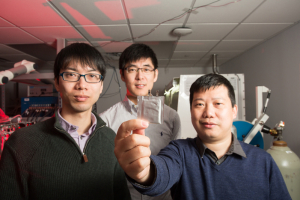Yan Yao’s “Battery500” Award Selected for Phase II
A quest for better batteries has led the U.S. Department of Energy to invest an additional $800,000 in Yan Yao’s research project titled “High-Energy Solid-State Lithium Batteries with Organic Cathode Materials.”
Yao, associate professor of electrical and computer engineering at the UH Cullen College of Engineering, was one of 15 principal investigators whose seedling projects – focused on cutting-edge battery research – were funded through the DOE’s Battery500 Consortium. Each seedling awardee received $400,000 in 2017.
After an 18-month initial phase, the 10 most promising projects were selected to move into the second round of research time – another two years – and received additional funding. This brings the total funding for the project to $1.2 million.
A new battery for the future
Yao and his students have embraced the challenge of creating better, safer and cheaper batteries. The research team specializes in the creation of next-generation batteries that use abundant, low-cost materials.
During the first phase, the team introduced a class of high-energy quinone materials — which can be synthesized from plants and food like maize or soybean — to pursue the 500-Wh/kg specific energy target set by the Battery500 Consortium. They achieved a highly reversible specific capacity of 400 mAh/g and recorded a 1000 charging cycles, while most solid-state batteries diminish rapidly after 100 charging cycles.
“The results confirm the moderate potential and soft nature of quinones are invaluable enablers of high-energy solid-state batteries,” Yao said.
In the second phase, the research team will explore approaches to increase the active material ratio and translate high material-level specific energy to the cell level.
“This is necessary to make these innovative batteries practical for real-world applications,” Yao said. “In addition, new organic materials with higher specific capacity and potential will be developed.”
Yao’s team will collaborate with Rice University on this project. “They have the tool to visualize the complicated microstructure of composite electrodes in 3D,” he said. “It will allow us to better understand the properties and create a better interconnected network in the electrode.”
These solid-state batteries could benefit a range of industries including renewable energy, aerospace, transportation and personal electronics. Since the DOE’s Battery500 Consortium is focused on advancing battery technology for electric cars, Yao expects the new batteries will initially be used in high-end products like luxury electric vehicles.
“We’re still at a pretty early stage and advanced manufacturing tools will be needed to scale up these solid-state batteries,” Yao said.
The University of Houston is a Carnegie-designated Tier One public research university. UH serves the globally competitive Houston and Gulf Coast Region by providing world-class faculty, experiential learning, groundbreaking research and strategic industry partnerships.
Located in the nation's fourth-largest city and one of the most ethnically and culturally diverse regions in the country, UH is a federally designated Hispanic- and Asian-American-Serving institution with enrollment of more than 46,000 students.
